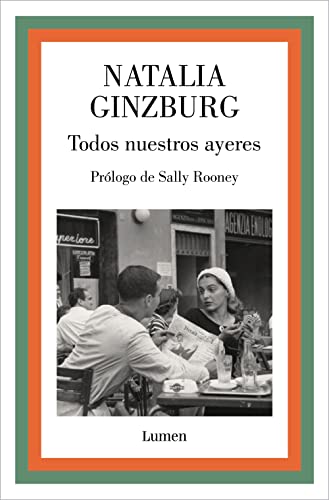The surname Levi is quickly associated in Italy with the anti-fascist struggle from literature to politics. But the truth is that Natalia Ginzberg (Natalia Levi really) has nothing to do with her contemporary, fellow Italian and also Jewish Primo Levi. And literature precisely caused their chance encounter on some occasion. But in the end in an inconsequential way. No spark arose and it is even known that Natalia rejected some of her works while she was working at the Einaudi publishing house.
So everyone continued their career and their life. Concepts of a literary career and life that became something inseparable (as a chronicle and commitment from the denunciation) in the difficult times that both of them had to live through from their youth. With that burden of hard times, Natalia became a kind of writer of testimonies that today seem like crime novels. Readings very different from those of then in search of empathy with the will to overcome the ominous by comparing them with a current review.
Because now, reading Natalia awakens that feeling of strangeness in the incomprehensible closeness to the monsters that can inhabit us as humans. Meanwhile, at one time or another, overcoming is observed as an undeniable ability of the human being, always.
Top 3 recommended books by Natalia Ginzburg
And that was what happened
What you never wanted to be told, that's what happened. And after knowing the ignominious human condition in its most barbaric expression, there can be little hope left to give birth to a book like this.
«For generations and generations—observes Italo Calvino in the prologue to this edition—the only thing the women of the earth have done has been to wait and suffer. They expected someone to love them, marry them, make them mothers, betray them. And the same thing happened with Ginzburg's protagonists. Published in 1947, "And That's What Happened," Natalia Ginzburg's second novel, is the story of desperate love; a confession, written in simple and moving language, of the heartbreaking lucidity of a single woman who for years has endured the infidelity of her husband and whose feelings, passions and hopes for her lead her to inexorably go astray.
«A story full of fears and desperate loves. Ginzburg, a combative and strong writer like few others, leads us in all her stories, so human and moving, so intelligent, with an everyday, concise, almost crude language ».
Family lexicon
The crudest testimonies, the most intense biographies in their proximity to the abominable take on the aspect of a fictional narrative. It is not something casual, perhaps it is the direct intention of the author. So that when closing the book everyone listens again to the strange reverberations, the confused echoes that finally clarify that what they read is true, that it happened in a very specific place and time. Hard days were going on in Europe and populism was rampant in each country, finally taking advantage of a violence allowed by the people covered in fear.
Wars and dictatorships. Nothing very different between Germany, Italy, Spain or other countries that during the XNUMXth century were nursing their own totalitarian regimes. But in this case we focus on Natalia Levi's Italy. And what he has to tell us, with his innate talent to relate events as experiences almost felt on the reader's skin, will bring us closer to Mussolini's Italy, which was already the hopeful antifascist outbreaks that corresponded to him.
Family lexicon talks about the Levi, a Jewish and anti-fascist family that lived in Turin, in northern Italy, from 1930 to 1950. Natalia was one of Professor Levi's daughters and was a privileged witness of the intimate moments of the family, of that chatter between parents and siblings that becomes a secret language. Through this peculiar lexicon we get to know Natalia's father and mother, some people who fill the book with vitality; We will also see the author's brothers, her first husband, politicians of great value and many of the intellectuals who animated the gatherings in these important decades of the XNUMXth century.
The little virtues
Halfway between the essay and the autobiography, "The Little Virtues" brings together eleven texts on a diverse subject that share an instinctive, radical writing, a plain and conclusively human commitment gaze.
The war and its heinous bite of fear and poverty, the chilling and beautifully sustained memory of Cesare Pavese and the intricate experience of being a woman and a mother are some of the stories of a history, personal and collective, that Natalia Ginzburg masterfully assembles, in these pages of disturbing beauty, with a shrewd reflection always attentive to the other, vital arch and testimony of the trade —Indispensable, organic vocation — to write. ”One of the best volumes that can be found by this author… The ironic, insightful, delicate and observant detail-oriented; the conscious and lucid witness of his time.
Other recommended books by Natalia Ginzburg
Valentino
The loves and the skill to channel them towards prosperity that has nothing to do with the soul or even with the home (probably the essential aspects that can launch an irrepressible love). Deception or simply the need to stir up morals always lurking like embers under bare feet. That everyone watching... when lovers end up being the center of the world, the essential subject of lies, the fire of envy, guilt and desires...
Although his parents are convinced that Valentino will become a great man, his sisters believe that he is nothing more than a vain, selfish and frivolous young man, more concerned with his conquests than with his medical studies. Valentino's sudden engagement to a rich but unattractive woman ten years older will end the dreams of her parents, who, scandalized by such an unfortunate choice, suspect her girlfriend.
With her characteristic bitingness and her prodigious psychological acuity, Natalia Ginzburg explores in Valentino social and gender expectations, class differences, wealth and marriage as prisons that suffocate the desires of her characters and turn even the most modest illusions into pure ones. chimeras
All our yesterdays
We stop being us based on circumstances. And we become others. That is what happens with the girl in this story. Because knowing her from her childhood is a wonderful entrance to her transformation. A soul that at times lets itself go, waiting for the implosion that ends up running riot towards that hostile world that in turn does not stop exploding. The outer world and the inner world as a place where the brilliant existential osmosis of an unforgettable character occurs.
Sometimes the naive look of a girl is enough to start a story that will change the lives of two families and the entire world. Anna, a sad and lazy bug in the words of Ginzburg herself, is that timid girl who lives in a town in northern Italy in the years before World War II and falls in love with her neighbor's toys; she is also the young woman who almost without protest submits to sexual violence, and she is the woman who follows Cenzo Rena, a man thirty years her senior, to an inhospitable place in the south after becoming her wife.
Anna is silent while everyone around her talks and gesticulates: there are those who spend their nights plotting attacks against Mussolini, others who drive around in convertible cars or vanish without giving explanations. With war come important decisions and extreme acts: the stage opens, breathes pain, calls for dignity, and fear is common currency.
What many have described as the best novel by Natalia Ginzburg returns to us, page by page, the gestures of an era and the years that forever changed the destiny of Europe.






1 comment on “The 3 best books by Natalia Ginzburg”